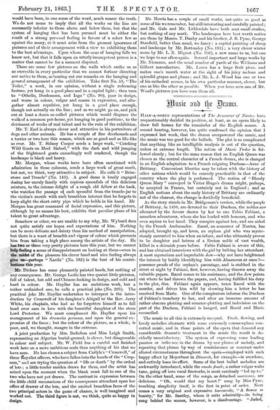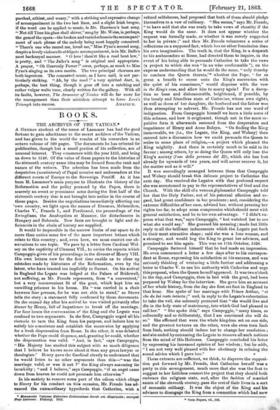MUSIC Rd itj pram.
HALF-A-DOZEN representations of The Armourer of Nantes have unquestionably decided its position, at least, as an opera likely to draw full houses for the remainder of the English season. A second hearing, however, has quite confirmed the opinion that I expressed last week, that the drama overpowered the music, and the music was too good for the ballads. The plot is so complicated that anything like an intelligible analysis is out of the question, unless at extreme length. The action of Marie Tudor is fol- lowed closely ; but for the same reason that an English Queen was chosen as the central character of a French drama, she is changed in an English adaptation to a French reigning Duchess—Anne of Brittany. Convenient liberties may be taken with the history of other nations which would be scarcely practicable in that of the country where the play is performed. The notion of "Bloody Queen Mary" conveyed in Victor Hugo's drama might, perhaps, be accepted in France, but certainly not in England ; and as English notions about the early history of Brittany are ordinarily not of the clearest, the change is decidedly beneficial.
As the story stands in Mr. Bridgeman's version, while the people of Brittany, in 1498, are devoted to their Duchess, the nobles are• alienated by the favour shown by her to one Fabio Fabiani, a nameless adventurer, whom she has loaded with honours, and who even aspires to her hand. They conspire against her, and are aided by the French Ambassador. Raoul, an armourer of Nantes, has adopted, brought up, and loves, an orphan girl who was myste- riously entrusted to him when an infant, and who ultimately proves to be daughter and heiress of a Breton noble of vast wealth, killed in a skirmish years before. Fabio Fabiani is aware of this, and has obtained interviews with the girl by bribing her attendant. A most mysterious and improbable Jew—why not have heightened the interest by boldly identifying him with Ahasuerus at once?— possesses proofs of the orphan's parentage, and is stabbed in the street at night by Fabiani, first, however, having thrown away the valuable papers. Raoul comes to his assistance, and the Jew points out where he had thrown the papers, and, having fulfilled his duty to the plot, dies. Fabiani again appears, taxes Raoul with the murder, and drives him wild by showing him a letter he has received from Marie. One of the conspirators informs the Duchess of Fabiani's treachery to her, and after an immense amount of rather obscure plotting and counter-plotting and indecision on the part of the Duchess, Fabiani is hanged, and Raoul and Marie reconciled.
The music to all this is extremely unequal. Fresh, flowing, and lovely melodies alternate with some extremely commonplace con- certed music, and in those points of the opera that demand any considerable dramatic treatment in the music the result is de- cidedly unsatisfactory. The system of expressing some leading passion or influence in the drama by one phrase of melody, and repeating that phrase by way of reminiscence or contrast under altered circumstances throughout the opera—employed with such happy effect by Meyerbeer in Dinorah, for example—is overdone, and entirely loses its effect. Some of the best ballad melodies are awkwardly introduced, while the rondo finale, a rather vulgar waltz tune, going off into vocal fireworks, is most carelessly "led up to." On the other hand, some of the songs, as detached morceaux, are delicious. " Oh, would that my heart !" sung by Miss Pyne, touching simplicity itself, is the first in point of order. Next comes a very original and expressive barcarolle, "A flower is beauty," for Mr. Bentley, whom it suits admirably—its being sung behind the scenes, however, is a disadvantage. " Jaded, parched, athirst, and weary," with a striking and expressive change of accompaniment in the two last lines, and a slight Irish brogue, if the word can be applied to music, is Mr. Harrison's best song. " Not till Time his glass shall shiver," sung by Mr. Weiss, is, perhaps, the gem of the opera—the broken and varied echoes in the accompani- ment of each phrase of the melody being most happily conceived. " There's one who reared me, loved me," Miss Pyne's second song, despite a lovely violoncello obbligato accompaniment, is in Mr. We's most hackneyed manner. " 0 love ! thou'rt like a reed bent low," is pretty, and "The Jailer's song" is original and appropriate. A prayer, " Oh Heavenly Power !" owes, perhaps, as much to Miss Pyne's singing as its own merits. The two principal choruses are both ingenious. The concerted music, as I have said, is not par- ticularly striking. "Ah, by the rood !" a very spirited duet, is, perhaps, the best thing, though it goes off into a catching and rather vulgar waltz tune, clearly written for the gallery. With all its faults, however, The Armourer of Nantes will do far more for the management than their mistaken attempt to force Love's































 Previous page
Previous page